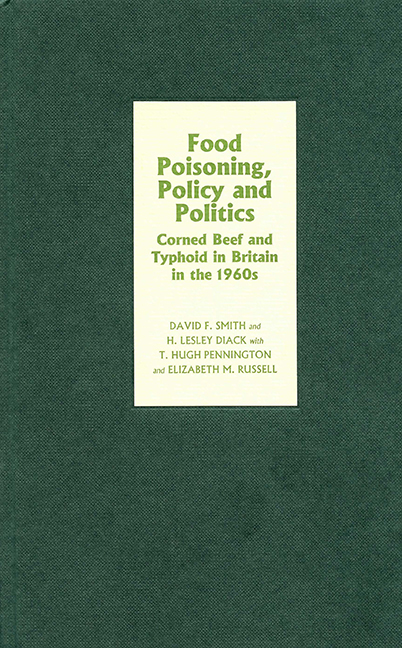Book contents
- Frontmatter
- Contents
- List of illustrations
- Preface and acknowledgements
- Abbreviations used in text
- Abbreviations used in footnotes
- 1 The earlier history of typhoid and food poisoning
- 2 The 1963 corned beef-associated typhoid outbreaks in Harlow, South Shields and Bedford
- 3 The Aberdeen typhoid outbreak
- 4 The medical officer of health, the media and the public in the Aberdeen typhoid outbreak
- 5 Ministers, officials and the Aberdeen typhoid outbreak
- 6 The Milne Committee of Enquiry
- 7 The recommendation on the inspection of overseas meat plants: the roles of existing policy agendas, and interdepartmental and inter-professional tensions
- 8 The disposal of suspect canned meat: the priority of politics over technical advice
- 9 British action to encourage improvements in Argentine meat hygiene, 1964 to 1969
- 10 Summary and conclusions, and food safety since 1964
- Appendix: Recommendations of the Milne Committee
- Bibliography
- Index
7 - The recommendation on the inspection of overseas meat plants: the roles of existing policy agendas, and interdepartmental and inter-professional tensions
Published online by Cambridge University Press: 24 October 2017
- Frontmatter
- Contents
- List of illustrations
- Preface and acknowledgements
- Abbreviations used in text
- Abbreviations used in footnotes
- 1 The earlier history of typhoid and food poisoning
- 2 The 1963 corned beef-associated typhoid outbreaks in Harlow, South Shields and Bedford
- 3 The Aberdeen typhoid outbreak
- 4 The medical officer of health, the media and the public in the Aberdeen typhoid outbreak
- 5 Ministers, officials and the Aberdeen typhoid outbreak
- 6 The Milne Committee of Enquiry
- 7 The recommendation on the inspection of overseas meat plants: the roles of existing policy agendas, and interdepartmental and inter-professional tensions
- 8 The disposal of suspect canned meat: the priority of politics over technical advice
- 9 British action to encourage improvements in Argentine meat hygiene, 1964 to 1969
- 10 Summary and conclusions, and food safety since 1964
- Appendix: Recommendations of the Milne Committee
- Bibliography
- Index
Summary
Introduction
Three recommendations in the Milne report concerned the system whereby Britain protected itself against the importation of human disease in meat and meat products. One suggested the development of an international inspectorate, and Willie Ross, Secretary of State for Scotland, reported in December 1965 that further consideration of this would await a report on meat and meat products by the WHO/FAO Codex Alimentarius Commission. The briefing document that the officials prepared for ministers showed that while they were happy for the commission to develop international standards, they were sceptical about, and uninterested in, the possibility of its replacing national inspectorates. Subsequently, overseas meat inspection did not evolve in the direction envisaged by the Milne Committee. Instead, the inspection of meat plants exporting to Britain, and other members of the European Community, has been transferred to the European Commission Food and Veterinary Office.
The second recommendation concerned the point at which responsibility for the safety of foreign meat and meat products passed from MAFF to the Ministry of Health. While legally MAFF and the Ministry of Health were jointly responsible, in practice MAFF inspected foreign meat plants and granted ‘official certificates’, and handed responsibility to the Ministry of Health only after the process of importation, including the inspection of consignments by port health authorities, was complete. The Milne Committee, however, suggested that the Ministry of Health should be responsible from the point of unloading. Making this adjustment proved relatively unproblematic. By the time of Ross’ December 1965 statement, it had been agreed that at the point of importation MAFF would only remain responsible for questions regarding the authenticity of official certificates.
This chapter will concentrate, however, upon the recommendation which concerned the number and qualification of those involved in the overseas inspections, the first part of which was already implemented by the time the Milne report was published. As Ross observed in his statement on 17 December 1964, two additional veterinary officers had been assigned to the work, which was formerly undertaken only by Leo Grace, the chief technical adviser on meat inspection, and Roger Blamire, his deputy.
- Type
- Chapter
- Information
- Food Poisoning, Policy and PoliticsCorned Beef and Typhoid in Britain in the 1960s, pp. 199 - 219Publisher: Boydell & BrewerPrint publication year: 2005

